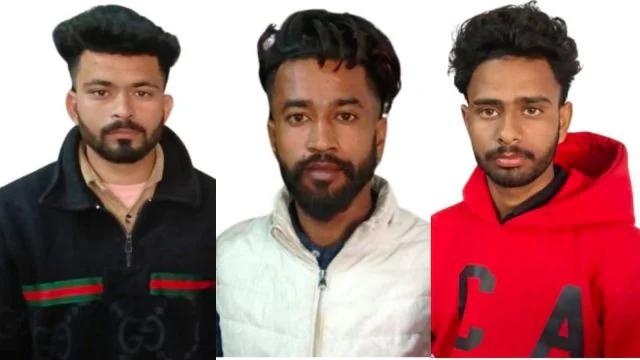In a significant development, three alleged members of the Khalistan Zindabad Force (KZF) were killed in an encounter in Pilibhit on Monday. These individuals were reportedly wanted for a series of grenade blasts targeting police outposts in Punjab. The incident marks a resurgence of KZF, a banned outfit that had remained dormant for a long period but is now gaining attention due to a series of small-scale attacks.
The profiles of the three men killed in the encounter reportedly align with the KZF’s operational style, which often involves employing small-time criminals rather than ideologically motivated members. According to police sources, these individuals were assigned specific tasks over phone calls by KZF operatives, highlighting the organization’s covert and calculated modus operandi.
The Rise Of Khalistan Zindabad Force
The Khalistan Zindabad Force was founded in the 1990s by Ranjeet Singh Neeta, a truck driver with a criminal background. Neeta fled to Pakistan with his wife, Charanjit Kaur, and settled in Lahore, where he turned to the Khalistan movement. Unlike other Sikh militants in Pakistan, such as Paramjit Singh Panjwar and Wadhwa Singh Babbar, Neeta formed his own organization, the KZF.
Using connections established through Pakistan-based smuggling networks during his truck-driving days between Jammu and Punjab, Neeta laid the foundation for the KZF. These networks allowed him to orchestrate criminal activities, including bomb blasts on trains and buses between Jammu and Pathankot in the late 1980s and 1990s.
Neeta’s criminal enterprise extended to supporting Kashmiri militant organizations, allegedly facilitated by Pakistan’s ISI. In 2021, he was booked for the murder of Deputy Superintendent of Police Devinder Sharma in Kathua, Jammu, further cementing his reputation as one of India’s most wanted fugitives.

The Decline And Resurgence Of KZF
By the late 1990s, the Khalistan Zindabad Force began to fade from prominence, with fewer reported activities. However, the recent rise of gangsters and smugglers in Punjab has breathed new life into the organization. Neeta’s name resurfaced in 2019 when the KZF was accused of using drones to transport weapons into India, marking one of the first instances of drone-assisted smuggling in the country.
The Amritsar Special Operations Cell filed a case against Neeta, accusing him of collaborating with Germany-based Gurmeet Singh (also known as Bagga) to smuggle arms, ammunition, explosives, and fake currency into India. This modernized approach to smuggling highlights the KZF’s adaptability and willingness to exploit new technologies.
Recent Low-Intensity Attacks
The Khalistan Zindabad Force has been linked to a spate of low-intensity attacks in Punjab, including grenade blasts and petrol bomb incidents. While these attacks caused minimal damage and no casualties, they bear the hallmark of the KZF’s operational style, aiming to create unrest without drawing significant attention.
Last month, the KZF claimed responsibility for a petrol bomb attack on the house of Shiv Sena leader Harkirat Singh Khurana. Fortunately, no injuries were reported. The organization’s reliance on small-scale attacks indicates its strategy to remain under the radar while asserting its presence in Punjab.

Pilibhit Encounter And Investigations
The three men killed in the Pilibhit encounter are believed to have ties to the KZF through local gangsters. According to sources, one of the individuals had direct connections with the KZF, while the other two were his associates. The police are currently investigating the nature of their involvement and how they came under the KZF’s radar.
Following the encounter, a purported audio recording of Ranjeet Singh Neeta surfaced on social media, where he threatened the Punjab and Uttar Pradesh Police, alleging a “fake encounter.” While the authenticity of the recording is being verified, it underscores the KZF’s attempts to maintain its relevance and intimidate law enforcement agencies.
The Modus Operandi Of KZF
Unlike other Khalistani groups, the KZF operates through a network of smugglers and petty criminals rather than dedicated militants. This approach allows the organization to execute attacks with minimal exposure while maintaining its operational capabilities.
Police sources have noted that KZF operatives provide instructions over phone calls, often targeting small-time criminals for specific assignments. This decentralized structure makes it challenging for law enforcement agencies to trace the organization’s activities and dismantle its networks.
Challenges In Tackling KZF
The resurgence of the Khalistan Zindabad Force highlights the persistent threat posed by separatist organizations in Punjab. While the state has made significant progress in curbing militancy since the 1990s, the rise of smuggling networks and gangsters poses new challenges for maintaining peace and security.
The use of advanced technologies, such as drones, to smuggle weapons and contraband underscores the need for enhanced border surveillance and intelligence-sharing mechanisms. Additionally, addressing the socio-economic factors that drive individuals to join such networks is crucial for long-term stability.
The Legacy Of Ranjeet Singh Neeta
Now in his mid-60s and reportedly ailing, Ranjeet Singh Neeta remains a central figure in the KZF’s operations. Despite his declining health, Neeta continues to coordinate activities from Pakistan, leveraging his extensive smuggling network to sustain the organization.
As one of India’s most wanted fugitives, Neeta’s influence extends beyond Punjab, with allegations of facilitating targeted killings and supporting militant organizations in Jammu and Kashmir. His enduring presence on India’s most-wanted list serves as a reminder of the complex challenges involved in addressing cross-border terrorism.
The Pilibhit encounter and the resurgence of KZF activities underscore the need for vigilance and proactive measures to counter emerging threats in Punjab and beyond. While the state has come a long way since the height of militancy, the evolving tactics of groups like the KZF highlight the importance of adapting strategies to address modern security challenges.

